|
|
|
Sort Order |
|
|
|
Items / Page
|
|
|
|
|
|
|
| Srl | Item |
| 1 |
ID:
139995


|
|
|
|
|
| Summary/Abstract |
During the quarter century before the First World War, anarchist terrorism was often blamed on the impact of anarchist agitators on naïve immigrants. This article seeks to investigate the truth of this claim, focusing particularly on Italian emigrants, but also looking at some examples of Spanish, French, and Russian emigrants. My conclusion is that, with a few exceptions, radicals emigrated, but emigration did not create radical terrorists. A particularly good example of this can be found by examining the large Italian emigration to Argentina. At most, the emigrant experience may have heightened a pre-existing radicalism or given more precise configuration to its violent expression.
|
|
|
|
|
|
|
|
|
|
|
|
|
|
|
|
| 2 |
ID:
119050


|
|
|
|
|
| Publication |
2013.
|
| Summary/Abstract |
Since the early 1990s several million men and women from Southeast Asia's lower socioeconomic classes have migrated to East Asia with a temporary worker visa or a spousal visa. This article is based on five years of ongoing fieldwork in migrants' communities of origin in rural Vietnam and in places of destination in Taiwan, South Korea and Japan. The authors make three contributions: first, they argue that the categorization of migrants as either "workers" or "wives" in research obscures the complex trajectories and motives involved in the process of "becoming a migrant." Second, they challenge studies that unquestioningly invoke social network approaches to migration. Instead, social networks should be regarded as a double-edged sword for emigrants because personal networks are embedded in a powerful migration industry. Third, they contend that migration outcomes and levels of success are, in part, influenced by processes taking place before departure. This article sheds light on the tension between migrants' agency and the structural constraints faced by candidates seeking to migrate from Vietnam, and from Southeast Asia more broadly.
|
|
|
|
|
|
|
|
|
|
|
|
|
|
|
|
| 3 |
ID:
147441
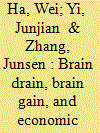

|
|
|
|
|
| Summary/Abstract |
We have used Chinese provincial data (1980–2005) to examine the effects of permanent and temporary emigration on human capital formation and economic growth in source regions. First, we find that permanent emigration is conducive to the improvement of both middle and high school enrollment. In contrast, while temporary emigration has a significantly positive effect on middle school enrollment it does not affect high school enrollment. Moreover, the different educational attainments of temporary emigrants have different effects on school enrollment. Specifically, the proportion of temporary emigrants with high school education positively affects middle school enrollment, while the proportion of temporary emigrants with middle school education negatively affects high school enrollment. Finally, we find that both permanent and temporary emigration has a detrimental effect on the economic growth of source regions.
|
|
|
|
|
|
|
|
|
|
|
|
|
|
|
|
| 4 |
ID:
140256
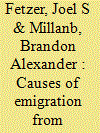

|
|
|
|
|
| Summary/Abstract |
Efforts to maintain a robust Singaporean economy have had to confront the serious challenge of substantial brain drain from the city-state. To address the negative effects of this problem, Singapore's ruling People's Action Party (PAP) has adopted a policy of increasing reliance on a foreign labor force. Meanwhile, the PAP appears to ignore the continued loss of human and intellectual capital. This study examines the main determinants of emigration from Singapore, specifically the political factors. The analysis is based on two primary data surveys that investigated what Singaporeans think about emigration: the 2006 Asian Barometer and the 2000–2002 Longitudinal Survey of Immigrants to Australia. Contrary to some previous empirical literature, data from these surveys indicate that anti–PAP and pro-democratic ideas strongly influence the decision of native Singaporeans to leave the island state. These findings likewise suggest that democratization and an expansion of business and technical education would be more effective in preserving economic growth than a policy of importing labor in the face of popular xenophobia.
|
|
|
|
|
|
|
|
|
|
|
|
|
|
|
|
| 5 |
ID:
081532
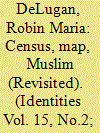

|
|
|
|
|
| Publication |
2008.
|
| Summary/Abstract |
Massive emigration and transnational realities affect postwar El Salvador. While the civil war (1980-1992) displaced vast numbers of people, the steady flow of citizens out of national territory continues today. As emigrants who remain connected to El Salvador demonstrate their increased economic and political capital, the government of El Salvador, elites, and media respond by re-shaping ideas about the nation and national belonging. This article describes how emigrants and their descendants are being administratively and symbolically re-incorporated into the postwar national imagination. "Symbolic politics" is how scholars describe sending-state practices to strengthen emigrant ties to the original homeland. Typically, the reference is to practices that export fixed ideas about the nation and national identity. This essay shows instead how emigration affects "symbolic politics" by transforming the very idea of the nation, its people, and its boundaries. Further, I posit that new state, media, and elite practices contribute to the simultaneity of incorporation that influences transnational belonging
|
|
|
|
|
|
|
|
|
|
|
|
|
|
|
|
| 6 |
ID:
091618
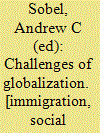

|
|
|
|
|
| Publication |
London, Routledge, 2009.
|
| Description |
xi, 210p.
|
| Standard Number |
9780415778077
|
|
|
|
|
|
|
|
|
|
|
|
Copies: C:1/I:0,R:0,Q:0
Circulation
| Accession# | Call# | Current Location | Status | Policy | Location |
| 054480 | 303.482/SOB 054480 | Main | On Shelf | General | |
|
|
|
|
| 7 |
ID:
157118
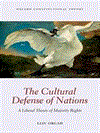

|
|
|
|
|
| Publication |
Oxford, Oxford University Press, 2017.
|
| Description |
xxiv, 273p.pbk
|
| Series |
Oxford Constitutional Theory
|
| Standard Number |
9780198806912
|
|
|
|
|
|
|
|
|
|
|
|
Copies: C:1/I:0,R:0,Q:0
Circulation
| Accession# | Call# | Current Location | Status | Policy | Location |
| 059280 | 304.8/ORG 059280 | Main | On Shelf | General | |
|
|
|
|
| 8 |
ID:
102420
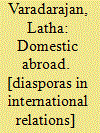

|
|
|
|
|
| Publication |
Oxford, Oxford University Press, 2010.
|
| Description |
vii, 244p.
|
| Standard Number |
9780199733910, hbk
|
|
|
|
|
|
|
|
|
|
|
|
Copies: C:1/I:0,R:0,Q:0
Circulation
| Accession# | Call# | Current Location | Status | Policy | Location |
| 055870 | 305.906912/VAR 055870 | Main | On Shelf | General | |
|
|
|
|
| 9 |
ID:
168851
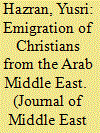

|
|
|
|
|
| Summary/Abstract |
Since the late 1950s, Christians’ emigration from the Arab Middle East has been a basic phenomenon affecting the political and social landscape of the region as well as a fundamental dynamic behind the depression of its Christian demography. This article shows that the intensive departure has been the result of structural and historical factors related to the performance of the modern Arab nation-states in the post-colonial era. Instead of the generalized and simplistic explanations that are often advanced that link the Christians’ emigration to Islamic revivals, the main dynamic of this out migration instead can be found in the policies of the modern Arab state and the outbreak of communal and regional conflicts.
|
|
|
|
|
|
|
|
|
|
|
|
|
|
|
|
| 10 |
ID:
099699


|
|
|
|
|
| Publication |
2010.
|
| Summary/Abstract |
Literature on international migration from India in the past has focused on the formation and development of 'Indian diasporas'; that is, Indians who have moved to various parts of the world and maintain socio-economic, cultural and political lives in India as well as other countries. However, little attention has been paid toward 'temporary migrants' who have migrated to different countries with a temporary visa and in the course of time extended their visas to become 'permanent residents'. Temporary migration from India has become a common trend over the last two decades, especially since the acceleration of globalisation and the developments in the fields of information and communication technologies. Although it is argued that this type of migration took place in the past - for instance, Indians migrated to British, French, Dutch and Portuguese colonies during the nineteenth and early part of the twentieth centuries as indentured labourers for a period of three to five years and later extended their stays - what is new about the current trend is the new state policies of different host countries and the socio-economic and cultural background of the immigrants. This paper is an exploratory study of this contemporary phenomena of movement from 'temporary migrant' to 'permanent resident', a phenomena which has not been given much attention by academicians and policy makers in India. The present paper outlines this trend with an illustration of Indian H-1B visa holders in the United States.
|
|
|
|
|
|
|
|
|
|
|
|
|
|
|
|
| 11 |
ID:
039686


|
|
|
|
|
| Publication |
New Delhi, People Publishing House, 1971.
|
| Description |
178p.Hbk
|
|
|
|
|
|
|
|
|
|
|
|
Copies: C:1/I:0,R:0,Q:0
Circulation
| Accession# | Call# | Current Location | Status | Policy | Location |
| 007974 | 923.277/BLA 007974 | Main | On Shelf | General | |
|
|
|
|
| 12 |
ID:
096589
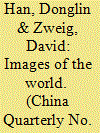

|
|
|
|
|
| Publication |
2010.
|
| Summary/Abstract |
Since the late 19th century many Chinese leaders have studied abroad, mostly in Japan, the US or the former Soviet Union. Recently, thousands are returning from studying overseas. Is this new cohort of returnees more internationalist than Chinese who do not study abroad? If their values differ and they join China's elite, they could influence China's foreign policy. Drawing on surveys of returnees from Japan and Canada over the past 15 years, we compare their views on "co-operative internationalism" and "assertive nationalism" with the attitudes of China's middle class drawn from a nationwide survey in 2006. Our returnees are both more "internationalist" than the middle class and less nationalistic. So they are likely to support China's increasing international role and perhaps constrain China's growing nationalist sentiment.
|
|
|
|
|
|
|
|
|
|
|
|
|
|
|
|
| 13 |
ID:
101529
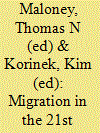

|
|
|
|
|
| Publication |
London, Routledge, 2011.
|
| Description |
xv, 288p.
|
| Standard Number |
9780415779142, hbk
|
|
|
|
|
|
|
|
|
|
|
|
Copies: C:1/I:0,R:0,Q:0
Circulation
| Accession# | Call# | Current Location | Status | Policy | Location |
| 055574 | 325.73/MAL 055574 | Main | On Shelf | General | |
|
|
|
|
| 14 |
ID:
191722
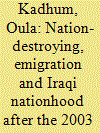

|
|
|
|
|
| Summary/Abstract |
While emigration and population displacements have long been a feature of Iraqi history, this article argues that the 2003 Anglo-American intervention in Iraq and its legacy has contributed to the gradual disappearance of many non-Muslim Iraqi minorities from Iraq. Though the legacy of 2003 can be attributed to a confluence of domestic and geopolitical factors, it is argued here that the 2003 intervention set in motion a process of nation-destroying instead of nation-building, as Iraqi nationhood was divided along primordial lines. Caught between competing ethnic and sectarian nationalisms, Iraqi non-Muslim minorities became targets in the quest for territorial gain and political power heralding an unprecedented and steady level of emigration. This has changed the ethnic and religious demographic of Iraq, the identity of the Iraqi nation-state, as well as fragmented Iraq's multiple ethnic and religious nations both inside and outside the country. Indeed, the effects of nation-destroying have also been transported to the diaspora, strengthening communal identities, altering attachments and creating distance between Iraqi communities abroad. This has led to distanced transnational ethnic and religious Iraqi nations in diaspora who must now also contend with assimilation, a loss of culture and language in the absence of physical links to Iraq. The article offers the first comprehensive and scholarly treatment of the effects of emigration of Iraq's non-Muslim minorities on Iraqi nationhood within the new Iraqi nation-state. It therefore contributes conceptually and empirically to advancing our understanding of the role of nation-destroying and emigration in nationalizing processes, a neglected area in current migration and nationalism scholarship.
|
|
|
|
|
|
|
|
|
|
|
|
|
|
|
|
| 15 |
ID:
157487
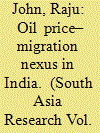

|
|
|
|
|
| Summary/Abstract |
Given that India is globally the top recipient of migrant remittances and over 90 per cent of Indian worker emigration is to oil-producing nations in the Gulf region, such significant economic relations between the two regions raise concerns that decreasing oil prices may lead to serious negative economic impacts. This article attempts to understand the association between emigration and oil price, assuming that fluctuations in oil price will adversely affect the economic prosperity of oil-producing nations and thus the emigration prospects of a significant section of global migrant workers, including millions of South Asians. Examining the association between changes in oil price and emigration from India more specifically aims to ascertain whether there is a direct correlation, so that reasonable precautions may be made regarding the impact of oil price changes on South Asian worker migrant flows.
|
|
|
|
|
|
|
|
|
|
|
|
|
|
|
|
| 16 |
ID:
115233
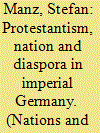

|
|
|
|
|
| Publication |
2012.
|
| Summary/Abstract |
This article examines the close connection between Protestantism and nationalism in Imperial Germany within a transnational context. In the years before 1914, the Prussian State Church in particular strengthened the legal and organisational framework for an increasing number of diaspora congregations to become attached. These acted as an important vehicle to embed the nationalist rhetoric produced within the Reich into emigrants' notions of belonging. Whilst previous scholarship has noted this connection in general, the article sheds more detailed light on the mechanics and structure, but also on the limits, of this process. Feedback processes from periphery to centre, in turn, had an impact on German national identity construction as that of a nation that was not confined to state borders. Applying a constructionist theoretical framework, the contested question of whether the heterogeneity of Germans abroad allows for the application of the diaspora concept is answered affirmatively.
|
|
|
|
|
|
|
|
|
|
|
|
|
|
|
|
| 17 |
ID:
152263
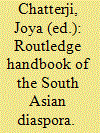

|
|
|
|
|
| Publication |
Oxon, Routledge, 2013.
|
| Description |
xv, 432p.: ill.hbk
|
| Standard Number |
9781138653252
|
|
|
|
|
|
|
|
|
|
|
|
Copies: C:1/I:0,R:1,Q:0
Circulation
| Accession# | Call# | Current Location | Status | Policy | Location |
| 059000 | 909.04914/CHA 059000 | Main | On Shelf | Reference books | |
|
|
|
|
| 18 |
ID:
185053
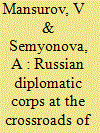

|
|
|
|
|
| Summary/Abstract |
THE SCHOLARLY value of the historical-biographical reference book The Last Diplomats of the Russian Empire: 1900-1917, prepared by career diplomat minister counselor second class Yury Ivanov and sociologist Yelena Ivanova* cannot be overestimated. It is a rich source of information about the Russian diplomats who served at the turn of the 20th century, during World War I and the revolutionary transformations in Russia. The collected material is valuable to researchers studying the history of diplomatic service, as well as to those interested in the history of Russian emigration. The book contains a trove of factual material indispensable for sociological studies of the specifics of professional groups and their emergence. Its scholarly value is unique: The material, professionally presented in compact form, immerses readers in the social and political problems of an entire generation of Russian diplomats while also providing information about the fates of individual diplomats.
|
|
|
|
|
|
|
|
|
|
|
|
|
|
|
|
| 19 |
ID:
046553
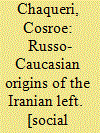

|
|
|
|
|
| Publication |
Richmond, Curzon Press, 2001.
|
| Description |
352p.hbk
|
| Series |
Caucasus World
|
| Standard Number |
0700714073
|
|
|
|
|
|
|
|
|
|
|
|
Copies: C:1/I:0,R:0,Q:0
Circulation
| Accession# | Call# | Current Location | Status | Policy | Location |
| 045022 | 955/CHA 045022 | Main | On Shelf | General | |
|
|
|
|
| 20 |
ID:
161454
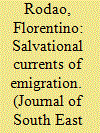

|
|
|
|
|
| Summary/Abstract |
This article analyses the changing significance of racial theories in the writings of Spanish emigrants in the late nineteenth century Philippines. Works by Antonio Cañamaque, Pablo Feced (Quioquiap), and Antonio Barrantes show how racialised understandings of colonial society in the Philippines evolved, from an initial dismissal of hybridism and rejection of mestizos to assertions of the innate superiority of the ‘white race’ and advocation of a rigid separation between local communities. These developments are considered in the context of the rising popularity of biological determinism alongside an influx of Spanish emigrants into the Philippines. The Spanish settlers used biological determinism to proclaim their role as the sole purveyors of both ‘progress’ and of a kind of egalitarianism. This article describes these debates and arguments, analyses their inconsistencies, and addresses the Filipino elite's responses to the settlers’ racial theories. These responses are read not simply as part of the development of Filipino nationalism, but as reflective of rivalries within the Spanish colonial community in the Philippines, where the locally born found additional reasons to support anticolonialism.
|
|
|
|
|
|
|
|
|
|
|
|
|
|
|
|
|
|
|
|
|